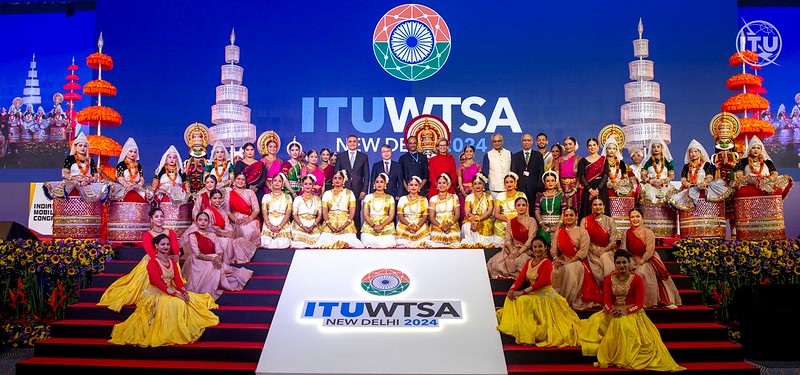
At WTSA-24, 37 Common proposals were submitted from the Communications Administrations of the Regional Commonwealth in the Field of Communications, including proposals for two new resolutions.
During the Assembly, the RCC Communications Administrations favoured the improvement of the database that would require telecommunications operators at the international level to ensure the transmission of caller identification information, which is expected to reduce the possibility of fraudulent calls and communications services. In addition, Resolution 65 was revised at WTSA-24 on the proposal of the RCC Communications Administrations, which, on the basis of the changes made, will allow work to begin on the establishment of conditions at the international level for the issuance of caller ID reliability certificates - through the adoption of the relevant ITU Telecommunication Standardization Sector Recommendations (ITU-T), including the formation of a global ‘certification’ centre that could identify appropriate certification centres for regions and subregions.
As part of the work to revise existing WTSA Resolutions on the basis of common RCC proposals, a number of technical Resolutions have been able to include proposals that strengthen the role and importance of regional telecommunication organisations, such as RCC, in ITU standardization activities. For example, as a result of the work carried out during the upcoming study period, it is recommended that the Director of the Telecommunication Standardization Bureau work with regional telecommunication organisations to better provide information and expertise to a wide audience on cybersecurity issues.
WTSA-24 approved eight new Resolutions that address various topics of relevance to the telecommunication field and important to the work of ITU-T, from new technologies to issues of strategic planning within ITU-T and engaging the next generation of engineers.
Speaking of new Resolutions of a technical nature, RCC Communications Administrations, as well as colleagues from other regions, realising the relevance of the subject matter, proposed two new Resolutions dedicated to research on Artificial Intelligence (AI) and metauniverse technologies.
The new Resolution on AI supports the development of ITU-T Recommendations, guidelines, evaluation procedures on the application of AI in telecommunications/ICTs, the exchange of concrete examples of relevant best practices, e.g. on operation, management, energy aspects, reliability, security of AI-enabled networks and protocols, services and applications, the Internet of Things, etc. The Resolution also supports the activities of ITU Member-States related to AI within the framework of the ITU Council Working Group on the Implementation of the World Summit on the Information Society and the Sustainable Development Goals. The Resolution also supports the AI-related activities of ITU Member-States within the ITU Council Working Group on the Implementation of the World Summit on the Information Society and the Sustainable Development Goals, designated by the ITU Council 2024 session as the ITU working body addressing top-level issues in the field of AI.
In turn, the new Metacommunication Resolution sets out the main directions for ITU-T to address technical issues related to metacommunication and related standardisation work to ensure effective integration and functional interoperability of the various technical components of the telecommunication/ICT metacommunication domain, including architectures, requirements, protocols, systems and services. The Resolution also envisages the establishment of a structure to coordinate the activities of the relevant ITU-T study groups and related standards development organisations and relevant parties outside ITU-T.
The Assembly approved 12 representatives of RCC Communications Administrations for the positions of vice-chairmen of the Telecommunication Standardisation Advisory Group (TSAG) and ITU-T Study Groups (SGs) in the new period:
- Nuron Mahmudov, Republic of Uzbekistan, TSAG,
- Zhavohir Aripov, Republic of Uzbekistan, SG2 ‘Operational Aspects of Telecommunications and ICTs’,
- Bakhtjon Smanov, Republic of Uzbekistan, SG3 ‘Principles of tariffication and accounting and economic and strategic issues of international telecommunication/ICT’,
- Saidiakhrol Saidiakbarov, Republic of Uzbekistan, SG5 ‘Environment, Climate Change, Circulation Economics and Electromagnetic Fields’,
- Doniyor Safarov, Republic of Uzbekistan, SG11 ‘Signalling requirements, protocols, testing specifications and combating counterfeit telecommunication/ICT devices’,
- Alisher Babakhanov, Republic of Uzbekistan, SG12 ‘Performance, Quality of Service and User Assessment of Service Quality’,
- Obid Asadov, Republic of Uzbekistan, SG13 ‘Future Networks and Emerging Network Technologies’,
- Umar Izbasarov, Republic of Uzbekistan, SG15 ‘Networks, Technologies and Infrastructure for Transport, Access and Housing’,
- Farhad Belonogov, Republic of Uzbekistan, SG17 ‘Security’,
- Mars Sydykov, Kyrgyz Republic, SG20 ‘Internet of Things, Digital Twins and Smart Sustainable Cities and Communities’,
- Khusan Soatov, Republic of Uzbekistan, SG20,
- Sirojiddin Usmanov, Republic of Uzbekistan, new SG 21 ‘Multimedia Technologies for Systems, Content Delivery and Cable TV’.















